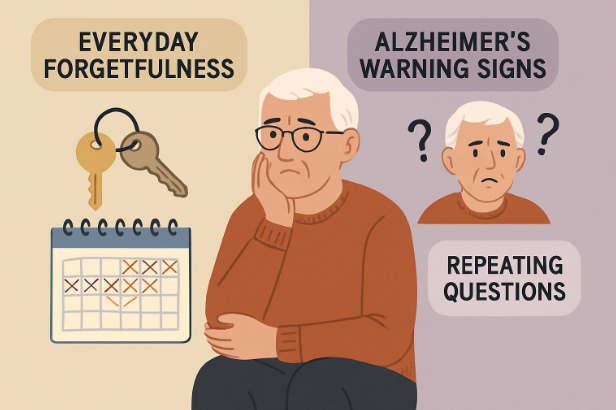Forgetfulness is a regular part of aging, but distinguishing it from early signs of Alzheimer’s is crucial. Occasional memory lapses, like misplacing items, are familiar with age, while persistent confusion, difficulty completing familiar tasks, or personality changes may indicate something more serious. Recognizing the difference helps ensure timely medical evaluation and support. Early detection can provide access to treatments, lifestyle adjustments, and resources that improve quality of life and ease the journey for individuals and families.
What’s Normal Forgetfulness and What’s Not?
Memory lapses can be unsettling as we age, but not all are serious problems. Normal age-related forgetfulness is often harmless and becomes more noticeable after stressful days, fatigue, or multitasking. However, memory loss can indicate severe conditions like dementia or Alzheimer’s disease. Understanding these differences is crucial, and reviewing the stages of Alzheimer’s Disease can help recognize when forgetfulness may warrant a closer look.
Memory lapses are common as we age, but they can be a warning sign of more serious issues. Stress, lack of sleep, and juggling multiple responsibilities can affect short-term memory. These factors are generally reversible, but the intensity and frequency of forgetfulness differentiate normal aging from a cause for concern. Recognizing the difference between typical memory changes and more serious symptoms can provide peace of mind and ensure swift attention.
The Science Behind Forgetfulness and Alzheimer’s
With age, the brain naturally undergoes changes. For most people, this means slower recall but not a complete loss of information. The hippocampus—vital for forming new memories—shrinks slightly, and some neurons deteriorate. However, in Alzheimer’s disease, these changes are much more severe: protein deposits disrupt nerve cell function, and connections are lost at an accelerated rate.
The differences between normal aging and Alzheimer’s disease are often a matter of degree and progression. Typical age-related memory issues don’t severely impede daily life, whereas Alzheimer’s involves increasing disorientation, difficulty handling familiar tasks, and confusion about time and place. Research shows that genetics, cardiovascular health, and lifestyle all play a role in determining who develops Alzheimer’s.
Early Signs of Alzheimer’s to Watch For
- Disruptive forgetfulness: Forgetting recently learned information or asking for the same details repeatedly can interfere with everyday life.
- Problem-solving struggles: Finding it difficult to plan, manage bills, or work with numbers may indicate cognitive impairment.
- Misplacing things: Placing items in unusual places, struggling to retrace steps to find them, or becoming easily confused about time and place is a warning sign.
- Real-life stories: Many people recognize symptoms when loved ones begin to repeat questions, withdraw from social activities, or show unusual irritability about routine changes.
Simple Ways to Test Your Own Memory
Self-checks for memory can involve simple exercises: try recalling what you ate for breakfast or listing your activities from the previous day. Repeating a grocery list after reading it can also indicate short-term memory strength. These at-home tests offer quick insight, though they’re not foolproof—a professional evaluation is needed to confirm any concerns.
Online quizzes and smartphone apps can help track changes and prompt you to seek help if declining trends appear. However, these tools have clear limitations and should never replace medical advice.
When Should You Seek a Professional Opinion?
If forgetfulness begins to impact daily routines, disrupt work, cause safety concerns, or is noticed persistently by friends or family, it’s time to consult a healthcare professional. Memory assessments may include questions about mood, problem-solving, reasoning, and recalling details. Cognitive screening tools help reveal patterns distinguishing normal aging from more serious decline.
Before your appointment, note specific examples of forgetfulness, mood changes, and any medication or major life events. This preparation will help your healthcare provider make a more accurate assessment.
Lifestyle Choices That Support Brain Health
Habits play a significant role in promoting sharper memory and protecting against cognitive decline. Consistent, quality sleep is vital for memory consolidation. Regular physical activity improves blood flow to the brain and reduces risk factors for Alzheimer’s, such as obesity and hypertension. Managing chronic health conditions, like diabetes and heart disease, also helps safeguard brain function.
Diet and mental stimulation matter as well. Researchers suggest foods rich in leafy greens, berries, whole grains, lean proteins, and healthy fats can slow memory loss. Brain-challenging activities—crossword puzzles, learning a new skill, or playing strategy games—keep the mind agile and engaged.
Common Myths About Alzheimer’s and Aging Memory
It’s a myth that all forgetfulness signals dementia. Occasional lapses are a natural part of aging and not inevitably linked to Alzheimer’s. Another common misconception is that over-the-counter supplements or “miracle cures” can prevent cognitive decline. According to the Centers for Disease Control and Prevention (CDC), no proven supplement reliably stops or reverses Alzheimer’s; lifestyle choices and medical care are far more effective.
Supporting a Loved One Who’s Forgetful
If you’re concerned about a friend or family member’s memory, approach the subject with empathy and compassion. Focus on specific changes you’ve noticed, reassure them you’re there to help, and suggest seeking expert advice together rather than alone. Several local and national organizations offer resources, including support groups and educational material, to assist both individuals and families navigating memory loss.
Connecting to organizations like the Alzheimer’s Association or local senior centers can offer valuable information and support networks as you face these challenges together.
Final Thoughts on Forgetfulness vs. Alzheimer’s
Early recognition of concerning memory symptoms is key. Timely assessment and intervention may slow disease progression, improve outcomes, and give families more time to plan and adapt. As research advances, there’s growing hope for effective therapies and better support for those with cognitive decline.
